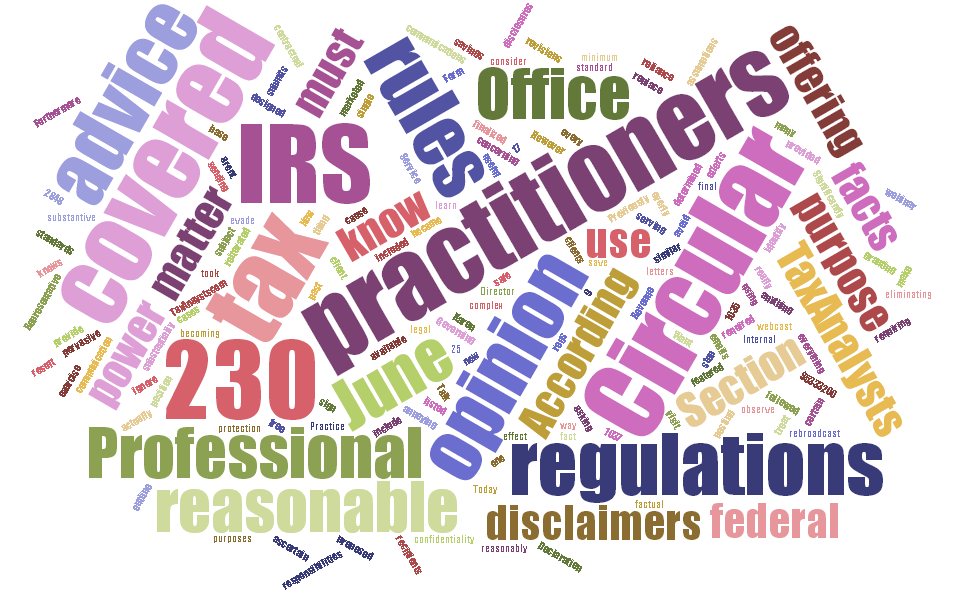Do you know those annoying disclaimers featured in emails and other client communications from tax practitioners to clients? They are becoming a thing of the past.
According to a posting by TaxAnalysts (available on TaxAnaysts.com), the IRS Office of Professional Responsibility will be sending out letters asking practitioners to stop using disclaimers required under Circular 230 (Regulations Governing Practice Before the Internal Revenue Service). Karen Hawkins, Director of the Office Of Professional Responsibility, reiterated the IRS’ position on a Tax Talk Today webcast for TaxAnalysts on June 17.
Previously, Circular 230 Section 10.35 included complex rules for practitioners to observe when offering covered opinions for transactions. For this purpose, a “covered opinion” include those concerning listed and substantially similar transactions, transactions designed to avoid or evade tax, marketed opinions and opinions subject to confidentiality or contractual protection.
However, use of the Circular 230 disclaimer became overly pervasive as practitioners took the “safe way out” by attaching it to anything and everything. Now the IRS has determined that the rules really aren’t serving a useful purpose and have no substantive effect in many cases. In fact, attaching the disclaimer to every single communication could actually cause recipients to ignore it.
On June 9, the IRS finalized new regulations that replace the covered opinion rules with one standard for written advice under Circular 230, Section 10.37. As provided in the proposed regulations, the final regs outline the standards to be followed when a practitioner provide written advice on a federal tax matter. Significantly, the practitioner must base all written advice on reasonable factual and legal assumptions, exercise reasonable reliance and consider all relevant facts he or she knows or reasonably should know. Furthermore, the practitioner must use reasonable efforts to identify and ascertain the facts relevant to written advice on a federal tax matter.
After a practitioner submits Form 2848 (Power of Attorney and Declaration of Representative) granting them power of attorney, Hawkins says the Office of Professional Responsibility will treat the practitioner as covered by Circular 230 for all purposes.
According to the IRS, the revisions in the covered opinion rules will save tax practitioners a minimum of $5,333,200. The savings would result from eliminating provisions in the regulations requiring practitioners to make certain disclosures in a covered opinion.
Want to learn more about the Circular 230 provisions and responsibilities? The IRS is offering a free rebroadcast of a webinar by Hawkins on June 25. To sign up, visit
http://www.visualwebcaster.com/IRS/99089/reg.asp?id=99089.
Thanks for reading CPA Practice Advisor!
Subscribe Already registered? Log In
Need more information? Read the FAQs
Tags: Income Taxes, IRS, Software, Taxes





